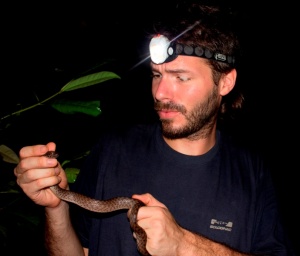Jervis, P., Pintanel, P., Hopkins, K., Wierzbicki, C., Shelton, J.M.G., Skelly, E., Rosa, G.M., Almeida-Reinoso, D., Eugenia-Ordoñez, M., Ron, S., Harrison, X., Merino-Viteri, A. & Fisher, M.C. (2021) Post-epizootic microbiome associations across communities of neotropical amphibians.
Molecular Ecology,
30(5), 1322-1335. DOI:10.1111/mec.15789 (IF2021 6,622; Q1 Ecology)
Microbiome–pathogen interactions are increasingly recognized as an important element of host immunity. While these host-level interactions will have consequences for community disease dynamics, the factors which influence host microbiomes at larger scales are poorly understood. We here describe landscape-scale pathogen–microbiome associations within the context of post-epizootic amphibian chytridiomycosis, a disease caused by the panzootic chytrid fungus Batrachochytrium dendrobatidis. We undertook a survey of Neotropical amphibians across altitudinal gradients in Ecuador ~30 years following the observed amphibian declines and collected skin swab-samples which were metabarcoded using both fungal (ITS-2) and bacterial (r16S) amplicons. The data revealed marked variation in patterns of both B. dendrobatidis infection and microbiome structure that are associated with host life history. Stream breeding amphibians were most likely to be infected with B. dendrobatidis. This increased probability of infection was further associated with increased abundance and diversity of non-Batrachochytrium chytrid fungi in the skin and environmental microbiome. We also show that increased alpha diversity and the relative abundance of fungi are lower in the skin microbiome of adult stream amphibians compared to adult pond-breeding amphibians, an association not seen for bacteria. Finally, stream tadpoles exhibit lower proportions of predicted protective microbial taxa than pond tadpoles, suggesting reduced biotic resistance. Our analyses show that host breeding ecology strongly shapes pathogen–microbiome associations at a landscape scale, a trait that may influence resilience in the face of emerging infectious diseases.

